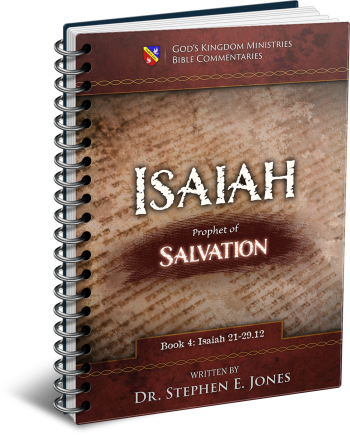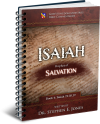Latest Posts
View the latest posts in an easy-to-read list format, with filtering options.

Isaiah is the prophet of Salvation. He is also known as the truly "Universalist" prophet, by which is meant that He makes it clear that salvation is extended equally to all nations and not just to Israel. He lived to see the fall of Israel and the deportation of the Israelites to Assyria, and he prophesied of their "return" to God (through repentance). He is truly a "major prophet" whose prophecies greatly influenced the Apostle Paul in the New Testament.
Category - Bible Commentaries

Isaiah foresaw the judgment of Israel, telling us that in the destruction and slaughter, “the dead will not live… and You have wiped out all remembrance of them” (Isaiah 26:14). As we saw, this statement was a reference to the destruction of the nation and does not apply to the ultimate resurrection of the dead at the final Day of Judgment.
Isaiah 26:15, 16 then speaks of the future restoration, saying,
15 You have increased the nation, O Lord, You have increased the nation. You are glorified; You have extended all the borders of the land. 16 O Lord, they sought You in distress; they could only whisper a prayer. Your chastening was upon them.
The restoration in verse 15 is preceded by repentance, as we see in the next verse. The prophet sees Israel beaten down to the point where “they could only whisper a prayer” because God’s “chastening was upon them.” Yet we know that “whoever will call on the name of the Lord will be saved” (Rom. 10:13).
In that day, the borders of the nation will be “increased,” or extended. The prophet does not explain this, nor does he define those borders. An Old Covenant viewpoint would look at Ezekiel 47 and 48 and interpret this to mean that the border will extend from the Nile to the Euphrates. The Israelis call this “Greater Israel,” and it is their goal to annex all of that land when they can. Their flag also declares this with the two blue bars above and below, which represent the two rivers.
However, that interpretation is based upon many false assumptions, most notably that the Old Covenant is still in effect and that the prophecy is about Judah rather than Israel.
We have a Messiah that is not only the King of (united) Israel but also the King of the whole earth (Isaiah 54:5; Rom. 4:13). His Kingdom has no boundaries for His dominion includes all that He has created. To see the promise in Old Covenant terms is to limit it to a tiny portion of the earth and to exclude other nations. But all nations will see the blessings of Christ’s Kingdom and desire His rule as well. He will be the King of Kings.
So Isaiah tells us that “You have extended all the borders of the land.” By not giving us any specific boundaries, he leaves open a New Covenant fulfillment that was promised to Abraham and to his seed in being a blessing to all nations of the earth.
Yet there was to be a long period of “chastening” before that time arrived. Details about that lengthy time of tribulation are found in Daniel 7, where we are told of four great kingdoms that were to arise (after Assyria). We have finally reached the end of that 2,520-year tribulation period (2017) and can therefore expect to see Isaiah’s prophecy fulfilled shortly.
Isaiah 26:17, 18 says,
17 As the pregnant woman approaches the time to give birth, she writhes and cries out in her labor pains. Thus were we before You, O Lord. 18 We were pregnant, we writhed in labor, we gave birth, as it seems, only to wind. We could not accomplish deliverance for the earth, nor were inhabitants of the world born.
Most agree that birth pangs are the equivalent of tribulation, which must take place prior to the birth of the Kingdom Age. Isaiah was to see the start of Israel’s tribulation at the fall of Samaria in 721 B.C. It would take another generation for Jeremiah to see the start of Judah’s tribulation at the fall of Jerusalem in 604 B.C. Together, these were the two beginning points of a lengthy time of tribulation that was to last “seven times,” according to the law of tribulation (Lev. 26:18).
In Isaiah 66:7-9 the prophet says more about this birth, which we will cover later. There he makes it clear that the woman (Israel) will surely give birth. But meanwhile, the prophet describes this birth in terms of resurrection.
Isaiah 26:19 says,
19 Your dead will live; their corpses will rise. You who lie in the dust, awake and shout for joy, for your dew is as the dew of the dawn, and the earth will give birth to the departed spirits.
This is obviously the opposite of what we read earlier in Isaiah 26:14, which described the death of the nation. Verse 19 reverses all that was said in verse 14. Whereas verse 14 says, “the dead will not live,” verse 19 says, “your dead will live.” Whereas verse 14 says, “the departed spirits will not rise,” verse 19 says, “their corpses will rise” and “the earth will give birth to the departed spirits.”
The two prophecies are separated by the “chastening” period. The death of the nation appeared to be hopeless, but the prophet says that the resurrection will be a time of great joy. This resurrection is also described in Ezekiel 37 in the vision of the valley of dry bones. Just when the people had given up all hope, saying, “Our bones are dried up and our hope has perished” (Ezek. 37:11), then God opens up their graves and raises them from the dead (Ezek. 37:12).
Yet to understand this resurrection, we would have to study many other Scriptures that refer to this event.
Isaiah 26:20 says,
20 Come, my people, enter into your rooms and close your doors behind you; hide for a little while until indignation runs its course.
The prophet thus spoke prophetically, not only to the generation of believers in his day, but also to many future generations which were to experience this “indignation” (za’am). The word is used often to describe divine judgment or God’s “anger.” The word pictures a father who is angry and indignant at his son’s disobedience or foolishness.
So verse 20 seems to picture an indignant father telling his son to go to his room (in seclusion) until the father’s indignation abates. Recall how God described the indignation in Isaiah 10:5,
5 Woe to Assyria, the rod of My anger and the staff in whose hands is My indignation [za’am].
Assyria was God’s rod of correction that represented God’s “indignation.”
The prophet concludes in Isaiah 26:21,
21 For behold, the Lord is about to come out from His place to punish the inhabitants of the earth [eretz] for their iniquity; and the earth [eretz] will reveal her bloodshed and will no longer cover her slain [those murdered unjustly].
In other words, God’s indignation against Israel was soon to be seen when He would use Assyria as His rod or staff to beat Israel for its disobedience. Verse 21 seems to apply to the land of Israel, rather than to the whole earth. The Hebrew word eretz can mean either land or earth, but in this case the context suggests it is about the land of Israel.
In this judgment, “the land will reveal her bloodshed.” To reveal is to uncover (galah), which in this case is a reference to uncovering evidence of “bloodshed,” or blood-guilt, i.e., murder.
This is a reference to Jerusalem being “the bloody city,” or the City of Blood (Ezek. 22:2). Whereas Jerusalem was supposed to be the City of Peace, it had become the City of Blood, mostly on account of its human sacrifice in the valley of Ben-hinnom (Jer. 19:4-6).